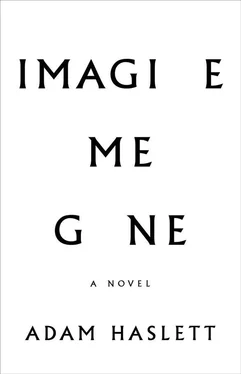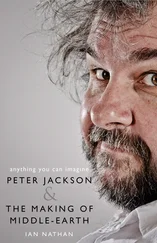Dr. Gregory had told me to take one pill in the morning and one before bed. I slept that night like a baby lamb on sedatives, and woke unafraid. Morning after morning this miracle repeated itself. I began to run experiments. I would summon my worst fears — that I would never get back to school, that I had already ruined my chance to do my larger work, that I was a burden to Caleigh, that she didn’t love me even as a friend but put up with me only because she was depressed and needed company — and I would dwell on each in turn, summoning the images that came along with the fears: being stuck in the house forever, Caleigh living thousands of miles away in love with someone else. And yet, lo and behold it, I couldn’t worry. I imagined this terrible future, I rehearsed the story lines, but my breath wouldn’t tighten, and thoughts moved through me as frictionlessly as a weather report.
I told Caleigh she had to try it, but when I dosed her one morning after breakfast she fell into a six-hour coma, and woke with a hangover, cursing me. Turned out she didn’t have an anxiety disorder. That was the thing about Klonopin: it didn’t just void my anxiety, it diagnosed my state like the X-ray of a fractured bone. The muscles of my face became so relaxed I expected to look in the mirror and see a basset hound. I’d never known a body could be so free of tension and still remain upright.
That fall I went back to school. I read by the hour, wrote papers, sat exams, and initiated my listeners into acid house. Caleigh and I spent all our time together, in our rooms, at the radio station, in the library, I imploring her to enter therapy, she resisting and putting me off, though still allowing me to make love to her. If I had hoped that my guilt about sleeping with her might dwindle with time, I was wrong. It only intensified. It wasn’t just about being a man who might repulse her, or cause her pain. It was being white, and yet free to touch her, to kiss her lips and breasts, to put my finger inside her, when twenty minutes earlier I’d been reading aloud from Andrea Dworkin or Sojourner Truth. This didn’t stop seeming wrong. I tried my best to focus solely on her pleasure, to ignore myself entirely in deference to her. But the political isn’t so easily banished. Yes, I wanted to abdicate myself, to give up my own person, because why else be in love if you can’t leave yourself in the dust? But it was more particular than that. Soon my deference had morphed into something more loaded: the desire to physically reverse racial privilege by becoming her slave. Where else could this transposition occur with any real force but in the trauma of sex?
One night in bed that spring, too consumed by the urge not to confess it, I whispered words to this effect into the porch of her ear. “Oh, Flipper,” she whispered back. “What do you mean? Some plantation thing?” My horrendous silence allowed the implication, Yeah, maybe, inverted? She placed her long fingers on my cheek and brushed my hair back with her other hand, as you might pat a child’s cowlick. She loved me enough by then, if only as a friend, not to be shy in my presence. For that, I’ll always be grateful to her — that she showed me who she was. “I get it,” she said. “I do. But not for us, Flipper. Not for us. Okay?” She shushed the stream of apologies that came out of me for even asking, holding a finger to my lips, and then, to my amazement, raised her head up off the pillow and kissed me.
So I kept that longed-for defeat in check, not wanting to trouble her, holding it at bay as I have ever since. It would be much tidier if the negligible chipping away I’ve done at the edifice of white supremacy issued purely from a concern for justice. But the fact is my life has been all caught up with black women (romantically, I would have been a lot better off as a lesbian of color, that’s for sure) so there’s no use pretending to some fiction of principle. I never would have kept up my work if I hadn’t seen up close the depression and self-hatred that the women I’ve tried to be with have suffered but not wanted to discuss. To think that their states of mind have nothing to do with politics or history would be as pitiably ignorant as imagining that my pining for them — their bodies and mothering care — isn’t likewise haunted.
I realize I’m going on here a bit in answer to the question on work history, it’s just that listing dates of employment doesn’t really get at what I’ve been up to. My real work began during that first reprieve of Klonopin. Caleigh had met a woman named Myra, a grad student at BC who TA’d one of her discussion sections. They struck up a conversation after class one day and had coffee a few times. Myra had grown up in Atlanta, gone to the University of Chicago undergrad, tended bar in Boston for several years, and now DJ’d at an all-women’s night in Central Square once a month. I could tell by the way Caleigh looked at me out of the corner of her eye whenever she mentioned her name that she was testing me to see how I would react. It is a measure of the power of benzos on the virgin mind that I could listen to Caleigh, who meant everything to me, talk about having coffee with this woman and not end up hospitalized for jealousy. She clearly wanted permission. She had forgiven me my terrible need for her. She had let herself be swayed by my devotion, and eventually persuaded by it. She’d even forgiven me my guilt for desiring her. What was I going to do now? Stand in the way of what she was trying to tell me she wanted? Just a few months earlier, my ambient dread and my obsession with her had been so entwined I would have been reduced to pleading and threats. Instead, I found myself bewildered at the equanimity of my response. It struck me then, for the first time, how unethical anxiety is, how it voids the reality of other people by conscripting them as palliatives for your own fear. For a moment there, I was able to step outside that, to hear what she wanted to be.
When Caleigh suggested that the three of us form a reading group to make up for the paltry offerings in African diaspora studies, it seemed like a perfect solution, a way for Caleigh not to have to choose between us. Myra was wary of me at first, knowing Caleigh and I were still sleeping together, and finding it hard to believe a white man could have much to contribute to discussions of black life. I didn’t blame her for this. But with Caleigh to vouch for me, she eventually came around, and the three of us spent our first month reading that giant of postcolonial psychiatry, Frantz Fanon. Not the world’s leading feminist, but you could fit on a postcard what he didn’t get about the psychic half-life of colonialism. On his advice, so to speak, we surveyed the more recent clinical-psych literature for studies on the treatment of black patients (shockingly, there wasn’t much). But I did come across the study that helped set me on my path.
A British psychologist working at a clinic in Manchester had written a paper about his treatment of black teenagers with recurring nightmares of slavery. Some dreamt of being confined to the holds of ships amid the withered and dying, others of being publicly stripped and lashed. One boy, who evinced no particular knowledge of black history, had a recurring nightmare that he was being hung from a lamppost and dismembered. It was the transcripts that got me. The author had excerpted them in an appendix. One of his subjects, in language replete with Mancunian slang, described seeing blood run down his chest and realizing it was leaking from the cuts inflicted by the iron collar around his neck. Not knowing what to make of the phenomenon — none of the boys knew each other and they attended different schools — the psychologist had interviewed family members to see if there were stories of enslavement among ancestors that might have been passed along in family lore, giving rise to the boys’ nocturnal fantasies. But he found no such pattern. What the boys did share were symptoms of depression, which, as the author noted, were not unusual among black teenagers, though few came in for treatment. It was the press of these particular nightmares that had driven them over the barrier of pride and stigma to seek his help.
Читать дальше












